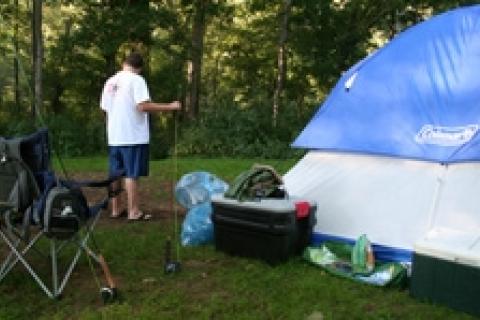
 Fishing and camping is a great match, and with a few tweaks to the packing and planning, a fish camp may be hard to beat in the fun category. Many campgrounds are built near a lake or river, and more often than not, the water is the main attraction. The best part of fishing a campground's waters is that camp is only a few feet away from the water's edge. Contact bait and tackle shops near the targeted water for suggestions on local camping opportunities. After several fish camping trips to various locations, favorite sites will beckon return visits.
Fishing and camping is a great match, and with a few tweaks to the packing and planning, a fish camp may be hard to beat in the fun category. Many campgrounds are built near a lake or river, and more often than not, the water is the main attraction. The best part of fishing a campground's waters is that camp is only a few feet away from the water's edge. Contact bait and tackle shops near the targeted water for suggestions on local camping opportunities. After several fish camping trips to various locations, favorite sites will beckon return visits.
A packing list is critical for quick getaway fish camping. The key to speed loading for a two-day fishing trip is to pack light. Pack only necessities. Think of food, shelter and fishing. A few selections of dry foods make for quick lunches and cereal bars are efficient breakfast materials to hold an angler for a few hours on the water. Pasta mixes provide a tasty and speedy supper, that is, if there is no fish. Load two coolers — one for drinks and chilled foods, and one to pack fish in ice if harvesting a few fillets is a part of the plan. If a few fillets are on the menu, don't forget to add the proper batter ingredients to the grub box.
The campsite setup should be simple but functional. An organized campsite is a happy fish camp. Searching for items in the early morning darkness before heading to the water creates unnecessary mayhem. With the possibility of stepping on dropped hooks or lures around camp, be sure rods and tackle are placed out of foot traffic areas. Stepping on a row of rods during the night is a surefire way to kill a fishing trip. It is wise to pack extra rods, reels and tackle for replacing accidents and to assure the proper rigs for various fish species. It would be a shame to come into a school of crappie while bass fishing and have your ultralight tackle at home.
Setting up camp from a vehicle in an organized campground is simple; backpacking into an area that is off limits to vehicles takes fine tuning of the packing procedure. Backpacking is an adventure in itself, so add fishing gear to the pack and the experience becomes even more interesting. Each fish camper should pack sufficient gear to sustain themselves during the trip. Extra gear means more weight; more weight means unnecessary labor to reach camp. When packing into an area that includes several lakes or ponds, light packing is essential. If the first stop of the hike doesn't turn up any action, light packing affords the angler or anglers to move on to the next water and better fishing quickly.
A camping trip focused around fishing opens more possibilities for future excursions. There is something special about sitting around a campfire after a days' fishing. Include a couple fish dinners to the experience and the statement of, "It doesn't get any better than this," may spill out of your mouth.
- 3035 views

